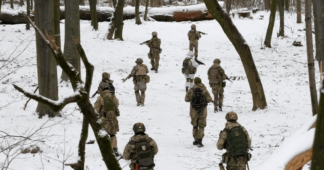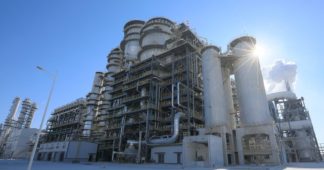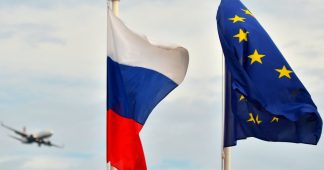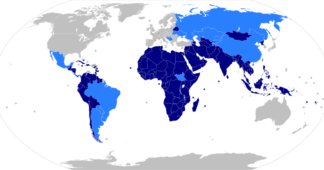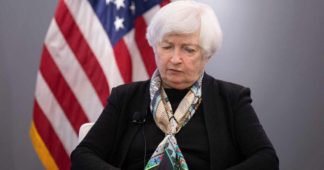Europe has lost the energy war, writes Thomas Fazi in his brilliant analysis of the European economic situation we reproduce below.
He attributes this defeat to the austerity obsession of the German and EU leaders and their sanctions policy towards Russia. Those polivies are due to the “incompetence” of German and European leaders.
On that we will disagree. German and European leaders are very competent in implementing everything the international Financial Capital and the USA are asking them to implement. They do it even if they risk to have a tremendous cost to the peoples, nations and countries they pretend to represent.
If there are incompetent people, we are the incompetent. Because we are afraid of opposing and condemning their policies. We are afraid of being attacked and isolated as “Putin’s friends, hatming our income and our careers.
We are the incompetent. Because we ,lack the courage to condemn openly our own Western imperialism, political, economic, military which is leading the world, the West included, to a precipice and without which the tragedy in Ukraine would never happen.
We are afraid of asking for a halt to arms shipments to Zelenski’s (that is the CIA – MI6) regime and for a lifting of sanctions. to ask for an immediate halt to the war, the sanctions and the arming of the Ukraine (Stop the War, lift the Sanctions and do it now! | Defend Democracy Press).
Unfortunately it is not only Europe which has lost the energy war. It is humanity which is loosing very rapidly the war for survival. This is what the new crisis around Taiwan proves, where the USA isd trying through Pelosi’s provocation to get us closer to the opening of a second front in this suiu generis war between the “West”, the ruling classes of the West and the rest of the world. This is also proved by the climate predictions. Too little time has been left for humanity to save life on Earth. We are antigonizing who will dominate the world but there will soon be no world to dominate.
We must stop the wars against Russia, China and Nature, and we must do it now!
Dimitris Konstantakopoulos
Europe has lost the energy war
After a decade of financial austerity, is Europe now on the brink of a new age of energy austerity? The city of Hanover has recently introduced strict energy-saving rules that include cutting off the hot water in public buildings, swimming pools, sports halls and gyms, banning mobile air conditioners, fan heaters or radiators, switching off public fountains, and stopping illuminating major buildings such as the town hall at night.
Meanwhile, several countries across Europe are considering dimming or switching off public lights, and even adopting “energy curfews”, with early closures for businesses and public offices. And more drastic measures are under consideration — including gas rationing for energy-intensive industries such as steel and agriculture.
These measures are part of an EU-wide Gas Demand Reduction Plan, ominously titled Save Gas for a Safe Winter, to reduce gas use in Europe by 15% until next spring. Among the proposals is a provision that officials in Brussels impose fines for non-compliance if they decide the crisis is escalating dangerously.
All of this comes amid growing fears that dwindling Russian gas supplies may plunge Europe into an energy crisis this winter. Overall, Russian gas exports to the EU are at about a third of last year’s levels, falling steadily since the invasion of Ukraine. While several European countries have been reducing their Russian gas imports, Russia itself has been reducing gas flows to Europe through Nord Stream 1, the continent’s biggest pipeline, citing mainly technical issues. Just the other day, citing equipment repair, Russia announced yet another reduction in the amount of natural gas flowing through Nord Stream 1, which is now operating at only 20% capacity.
This has caused natural gas spot prices to surge to levels not seen since early March; they are now almost 10 times higher than they were two years ago. In most countries, electricity prices have risen accordingly. Soaring energy prices are already fuelling record inflation — currently close to 9% and rising in the EU — squeezing people’s spending power, plunging thousands into poverty, and placing a huge burden on industry.
This is especially true for Germany, which is almost entirely dependent on Russian gas imports. Indeed, the country’s industrial production has been contracting for over three months. Astonishingly, 16% of industrial German companies have reduced production or partially stopped their activities due to rising energy prices. This helps explain why last month Germany became the first country to escalate its warning over gas supplies to the “alert level”.
The combined effect of rising prices, lagging demand (both internally and abroad, as China goes back into lockdown) and falling production and investment is already causing economic growth on the continent to grind to a halt. While institutions such as the European Commission and the IMF, despite significant downward revisions, still predict real GDP in the EU to be around 2.5% this year, several analysts consider even these far-from-rosy predictions to be overly optimistic. Carsten Brzeski, Chief Eurozone Economist at ING bank, for example, foresees a recession at the end of the year as high prices sap purchasing power.
To make matters worse, the ECB’s recent decision to raise interest rates will do little or nothing to curb inflation caused by supply-side factors, but will almost certainly further depress economic activity, making it harder for states to mobilise resources needed to cushion the effects of the energy crisis. And as for the ECB’s recently launched Transmission Protection Instrument (TPI), aimed at helping countries in financial distress, it may only be activated for those countries judged to be “fiscally sustainable” (a questionable concept in itself), even though the current polycrisis is inevitably bound to put a strain on the public finances of European countries.
Furthermore, even though the EU has sensibly — for once! — proposed to keep the EU’s fiscal rules suspended for another year, several countries, led by Germany, have announced their intention to embrace austerity once again. “For Germany, it’s clear: we will not make use of the general escape clause,” said the German Finance Minister Christian Lindner, arguing that the priority now had to be fighting inflation. “We will return to the debt brake. We have to stop the addiction to ever more indebtedness.” For this, he added, “we have to get out of our expansionary fiscal policies, and out of the debts, so that the central bank has the space to fight inflation with its means”.
In other words, Germany seems intent on once again plunging the continent even deeper into recession through utterly self-defeating austerity, just as it did in the wake of the financial crisis. Europe is already heading for a stagflationary scenario — a situation where high inflation is associated with low or negative growth. Austerity would simply make a bad situation even worse.
If things are bad now, however, it goes without saying that a further decrease in Russian gas flows, which still account for 40% of the EU’s gas imports — not to mention a full stop — would have utterly catastrophic consequences, especially if that were to happen during the winter, when demand for gas it at its highest. Energy, after all, is literally the lifeblood of the economy. It’s what keeps our houses lit and warm (or cool), and our cars, industries, supermarkets and electronic gadgets running. Without it, civilisation literally comes to a halt.
This is why if Europe’s energy supplies are unable to meet demand, the consequences would be almost unimaginable: factories would be forced to close, workers would be laid off, and households forced to restrict electricity and heating use to certain hours. It would be nothing short of societal meltdown. Germany’s Foreign Minister Annalena Baerbock recently admitted that shortages of natural gas this winter “could spark popular uprisings”. Think riots, looting, martial law, possibly even toppled governments.
In an attempt to stave off this doomsday scenario, the EU has adopted a regulation providing that underground gas storage on member states’ territory must be filled to at least 80% of their capacity by the end of October (it’s currently at 67%). That, however, depends on stable flows in the following months. Moreover, even if the 80% target is reached, that still wouldn’t be enough to get countries through the whole winter without continuous supplies of more gas. While at current capacity, the EU would have just enough gas to get to the end of November (assuming an October 1 start to winter).
Moreover, storage levels and storage capacity vary greatly in the EU. Some countries, such as Spain, Portugal, Bulgaria and Croatia, would run out by December even at full capacity (while others are lagging seriously behind in filling the tanks up). Germany remains the most exposed. Despite having by far the largest storage tanks in Europe, its demand for gas is equally large and its tanks only hold 108 days of consumption — full tanks would run dry on February 16 and they are currently only 67% full, which would be emptied in December if Russia turned off the gas tomorrow.
Overall, it’s highly unlikely that Europe would survive a full cut-off of Russian gas. While some countries have successfully managed to partially replace Russian gas imports with alternative, albeit more expensive, sources of gas — such as liquefied natural gas, or LNG — others, first and foremost Germany, remain heavily dependent on Russian imports.
So ultimately we have little choice but to hope in Putin’s good will if we want to make it through the winter. Yet Russia’s leader is not the only one to blame for our current predicament. If today we find ourselves on the brink of disaster, and already facing massive economic hardship, the responsibility falls squarely on the shoulders of European leaders. Put to one side the fact that waging “total economic and financial war” on a nuclear-armed regional power that shares more than 2,000 kilometres of borders with Europe could hardly be considered a sensible move, it was glaringly obvious that cutting off Europe-Russia economic relations was going to hurt the former much more than the latter, given Europe’s dependency on Russian gas. Indeed, European leaders indirectly admitted this when they excluded Russian oil and gas exports from the sanctions regime. There’s something pathologically infantile about the behaviour of European leaders: they enjoy strutting around on the world stage and making grandiose speeches about “democracy standing up to autocracy”, and yet they don’t seem to be cognisant of the real-world consequences of their words.
The question of Russian supplies is a perfect case in point. At the start of the conflict, the EU, which before the war got some 40% of its gas from Russia, announced its intention to reduce those gas imports by two-thirds by the end of the year and phase out Russian gas entirely by 2027. Indeed, for the past six months European leaders have been boasting about weaning themselves off it in order to “hit Putin where it hurts the most”. And yet today they moan about inflation and rising prices — what did they think would happen? — and were gripped by panic and moral outrage when Gazprom announced that it would be slashing its gas flows to Europe.
Is Russia weaponising the flow of gas in its tug of war with Europe? Of course it is. But Europeans started this game. Or perhaps they thought they could engage in a unilateral energy war with Russia, at their own pace and conditions (which is why they excluded Russian oil and gas exports from the sanctions regime), without the other side firing some shots back at them. To make matters even more grotesque, not only has the “gas war” not weakened Russia — it appears to have actually strengthened it, by helping Russia massively increase its inflow of foreign reserves on the back of rising energy prices.
For all the barbarity of Putin’s war, the livelihoods of millions of Europeans have already been sacrificed on the altar of the gross incompetence of European leaders. And the livelihoods of millions more are at risk. They’re right about one thing, though: the future of Europe depends on the struggle between democracy and autocracy — between us, the people, and them, the autocrats.
